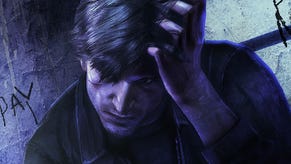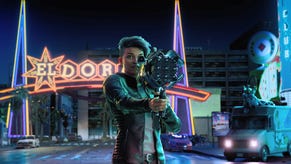Danny's dark horse: Long game for THQ's FY12 and beyond
Last time we checked in on THQ, it was ditching its license-mill reputation, eyeing a top five spot and taking calculated gambles on new IP. This week, it's down $136m and announcing "casual" titles. What happened? Nothing: this is THQ's long game.
The days of finding an upcoming kids' movie, churning out a platformer and rolling in the green are over. The money has run out of the license market. Big sports titles - of which THQ has two - and massive transmedia opportunities like Harry Potter - which it doesn't have - are the last dregs of what was once one of the surest bets in the games industry.
This left THQ - a company which let its core development lapse - in a difficult position. But faced with the evolutionary adage "adapt or die," THQ proved its not ready for the tar pits just yet and launched a daring double-pronged attack.
At the spear head of one is Danny Bilson, that rarest of beasts - a gaming executive who actually loves games.
Bilson's bid
As VP of core games, Bilson, who joined THQ in 2008, is aptly titled and positioned. He wants the core dollar, the loyalty of gamers who fall over themselves to pay for big, quality titles. He wants to get it by crafting solid, new gaming experiences. What's not to like?
We've already seen one unusual dividend from this strategy: Homefront. Bilson's too savvy (and investor-wary) to throw all his eggs in one basket, but he knows it's only by experimenting with new IP and relevant, modern gaming styles that he can woo back the hardcore gamer.
Despite disappointing critical reception, Homefront has clearly performed well enough that it's ready to take another go. It will learn from criticism - of a short single-player campaign and buggy multiplayer - and do better next time; in fact, ongoing multiplayer support and rapid post-launch fixes have already put the publisher ahead of the pack in after-sales support.
THQ took a hit this quarter, but it's a hit it was expecting - an off-year. You can't turn around and start churning out triple A releases overnight, and a glance over THQ's FY 2012 and 2013 schedule shows its confidence in the Hollywood producer turned gamer-in-power paying dividends.
FY 2013
In June, Red Faction: Armageddon - a tried-and-true property with a vocal PC fanbase in addition to console credit - kicks off what is to be a string of strong releases piling up into a two-year long jackpot.
Relic's Warhammer 40,000: Space Marine drops in August, and it's not hard to see why hype is already building. The studio is better known for its strategy stylings, but it knows the complicated 40K canon backwards, and the crowd behind 6 million Dawn of War sales will likely make the jump to third-person action without much trouble.
Saints Row: The Third arrives in time for the critical holiday period, filling an expected continuing gap in the GTA schedule with its unique take on the open-world crime genre. This is a franchise with more weight behind it than the unbelievers give it credit for, and with a strong marketing push and good timing, this iteration may garner the spotlight the series deserves.
In March 2012, we'll see another entry in the UFC license. This unrivalled star of the MMA world is rapidly becoming one of the most recognised sports licenses thanks to strong IP control, and while that's paying off in THQ's favour, a serious treatment of the genre certainly helps.
The WWE license is less certain, as the sequel-grinding took a little of the lustre from it, but again, THQ's commitment to putting the polish back in has redeemed the series, and a new instalment due over the holiday season could be a strong bet. The two licenses have shipped over 7 million units between them.
After this, things get a bit hazier in terms of dates, but we do know that FY 2013 - which runs until April, 2012 - will serve up some heavy hitters. Sequels Darksiders 2 and Metro: Last Light join the second, more distinct Warhammer MMO attempt, Dark Millennium Online.
On top of that, we have a couple of wild cards: Itagaki's Devil's Third, a new action IP still only vaguely detailed, and whatever it is they're up to at the newly-opened THQ Montreal studio - you know, the one headed by Assassin's Creed director Patrice Désilets - which has been poaching high ranked Ubisoft staffers.
The fancy dance
If the list above has you even mildly intrigued at this early stage, then the core division is set. But you can't devote your entire company to years developing massive, single titles and expect investors to hang on, and as with any major publisher, THQ is leashed to them.
That's not to say the rest of its portfolio is dutiful offerings - Spongebob Squarepants, Kung Fu Panda and Barbie tie-ins are, indeed, likely to result in padding for the bargain-bin, but they're also certain to bring quick cash injections while we wait out core development.
In the meantime, THQ is dancing some fancy steps. Its uDraw peripheral is about to uncouple from its dying mothership, the Wii, in a new, sleeker form designed for the major platforms, with six new games on the way. The sales performance of this little beauty has been gratifying, and its simple, low-cost appeal might well carry over where other peripherals have failed.
The upcoming MX vs ATV: Alive shows the publisher is highly aware of the digital revolution, and is moving with the times. Priced $20 below standard retail, the racer will launch with masses of DLC and a "long shadow" of more to come.
On top of traditional content packs, THQ is pushing for the micro-transaction pay-off, capitalising on our desire for differentiation with customisation options. Not only does it fail to alienate the pre-owner purchaser the way the online pass system does, it might even get some money out of him - or discourage users from selling on in the first place.
A focus on 3DS and Kinect, as well as Facebook titles, shows THQ is exploring its options in the rapidly bloating casual and social spaces, as well.
THQ's is a broad plan. Ignore the losses. There's a long way to go yet.







.jpg?width=291&height=164&fit=crop&quality=80&format=jpg&auto=webp)

.jpg?width=291&height=164&fit=crop&quality=80&format=jpg&auto=webp)